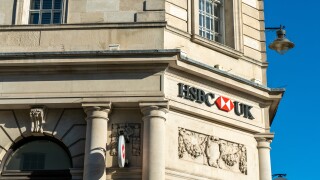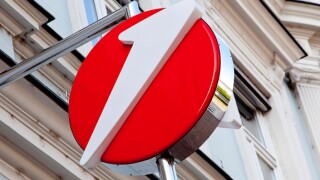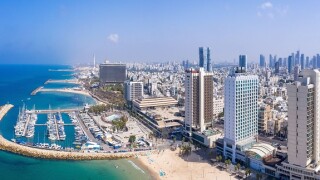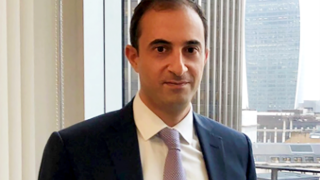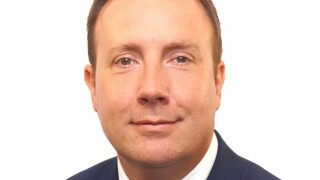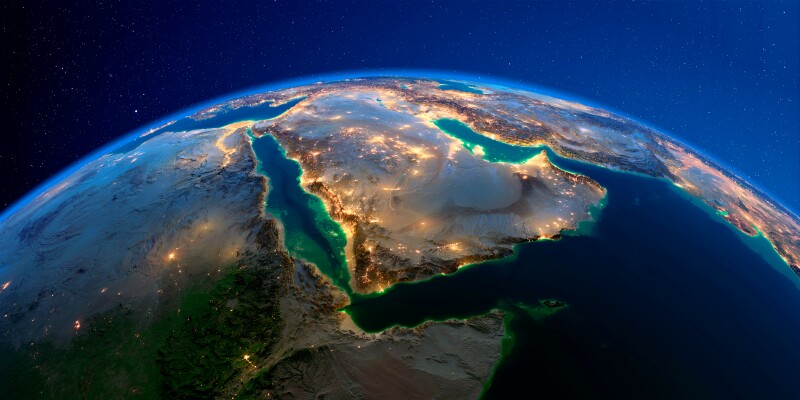
As capital markets houses scramble to work out what to do with their Russian franchises, the Middle East is emerging as an alluring region with a crucial role to play in world affairs — and plenty of capital raising to do, too.
Of course, for all the talk of agile working these days, investment banks are still not able to turn on a sixpence and suddenly become a regional leader. Firms that already have a solid track record in the Gulf Cooperation Council countries have a clear head start.
But when firms like Morgan Stanley and Goldman Sachs were puzzling over where to evacuate their Russian bankers to, it is interesting to note that they seem to have chosen Dubai rather than London or anywhere else.
But while it is clear that the Middle East is going to be important, it is less obvious exactly what the world order will look like after the dust from Russia's invasion of Ukraine has finally — and hopefully sooner rather than later — settled.
Western leaders Joe Biden and Boris Johnson seem to have come away from their recent attempts to cosy up to Saudi crown prince Mohammad bin Salman empty handed, for now at least. Meanwhile, the kingdom appears receptive to the idea of selling oil to China in yuan, which would chip away at the dollar's dominant position in international trade.
Balancing act
None of which makes the balancing act of one bank in particular — HSBC — any easier. The London-based firm has always been huge in Asia but has been devoting even more attention to the region lately, while reducing the amount of its balance sheet that is tied up in the West. This has put it in an awkward position in the past, and it seems likely to do so again.
As David Rothnie writes for GlobalCapital this week, HSBC is still firmly committed to its US business. Its role as a bridge between East and West remains a key strength and, as its executives like to point out, much of the revenues of its global banking and markets business derive precisely from its ability to conduct business in the East for clients based in the West.
But if we are witnessing the rollback of globalisation from its high watermark, surely that at least raises some questions about a business model that relies so heavily on international interconnectedness.
But while East-West tensions could put HSBC in a tricky position, it is worth noting that it is also one of the banks well positioned to take advantage of the rise of the Middle East as a promising region for the capital markets.
Dubai Electricity and Water Authority (Dewa) was set to launch its listing in Dubai on March 24 as the Emirate lines up nine more assets for privatisation via initial public offering. HSBC is in at the ground floor on this wave of equity capital markets activity, having won one of three global co-ordinator mandates handed out for the Dewa deal.
ESG in the GCC
But the bank is not taking its established position in the region for granted. Seeing the energy transition as a crucial theme that will increasingly drive business in the Middle East, it is sending Zoe Knight, group head of its centre of sustainable finance, to Dubai to take on the extra role of head of climate change for the Middle East. She was previously based in London.
The move “reflects the importance HSBC is placing on financing transition across the Middle East,” the bank said in a statement.
Egypt and the United Arab Emirates are meanwhile preparing to jointly host UN climate talks in 2022 and 2023.
Besides climate change, another key theme that bankers and investors are getting excited about these days is technology. Of course, this has meant plenty of poaching of senior bankers in San Francisco. But another key location that has emerged for the global tech sector is located in the Middle East — Israel.
Could this have influenced French alternative asset manager Tikehau Capital's decision to open an office in Tel Aviv?
The firm has hired two seasoned locals to run the outpost — Asaf Gherman, the former head of alternative and direct investments at Israeli insurance group Migdal and more recently head of syndication, debt management and products at Bank Leumi; and Rudy Neuhof, Migdal's former head of private and structured debt.
Tikehau's arrival in Tel Aviv follows that of Blackstone, which hired Yifat Oron from LeumiTech to head up its new office there last year. And if there's one thing investment bank executives insist on, it's how much they love following their clients.
And so, while it is difficult to make predictions about how the pieces of the geopolitical puzzle will finally land, the smart money seems to be confident that the Middle East, in one way, shape or form, will be an important part of it.
In other news
GlobalCapital exclusively reported this week that Benefit Street Partners, the credit arm of Franklin Templeton Investors, is in talks to acquire credit fund manager Alcentra from BNY Mellon.
We have been following the process closely since it emerged that BNY was having another go at selling the firm in December.
Meanwhile, JP Morgan has a new head of private capital markets in EMEA following the departure of Rahul Bhandari.
The bank has picked its existing head of EMEA emerging markets equity capital markets, Nicolas Skaff, to take on the role, but has not decided who will replace him in his old job.
Keep scrolling for all of the week's people and markets headlines from GlobalCapital.
Do you have a new job or a new hire to tell us about? Send it in confidence to richard.metcalf@globalcapital.com or call +44 (0)20 7779 7315.
Interested in accessing more GlobalCapital content? Contact us on +44 (0)207 779 8338 or send an email to subs@globalcapital.com to inquire about a trial.
More people news
-
Moves join dots between mid-market banking and structured finance while creating new lending division
-
UniCredit’s build-out in equity capital markets under Sam Kendall rolls on with hire from asset manager in Milan
-
Janne Holkko has been with the bank since 2011
-
French firm is latest alternative asset manager to set up outpost in Tel Aviv
-
Bank selects Skaff to replace departed banker
-
Promotion is part of broader reorganisation of Lloyds’ top team in US

